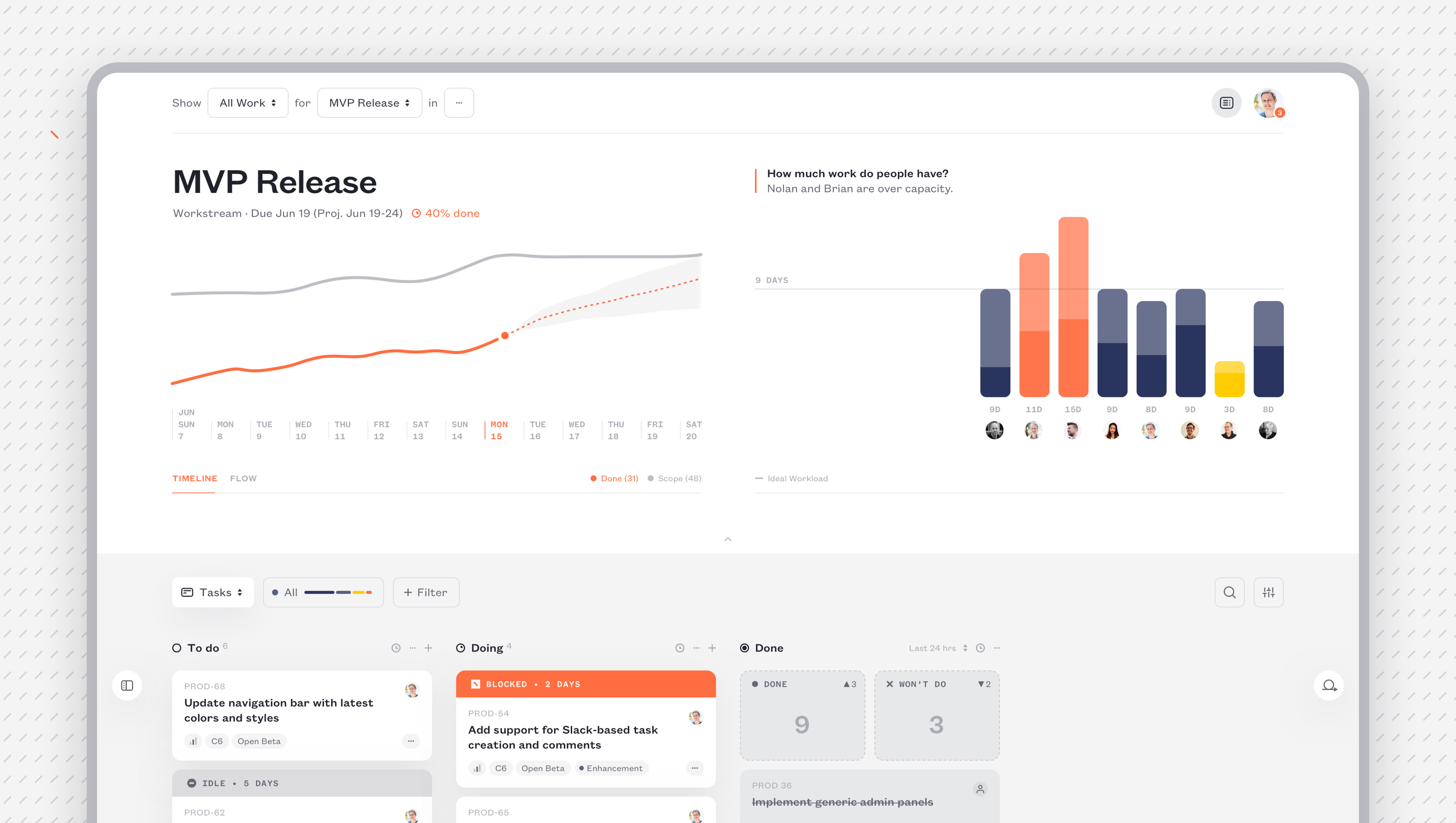INSIDE SOCRATIC
Socratic is a new kind of engineering intelligence
In software engineering, a lot of simple, essential questions remain hard to answer. Questions like:
How long will this work take?
Who's overloaded? Who has capacity?
Are we getting faster or slower? Better or worse? Why or why not?
Why are these questions so difficult? Why do we keep getting bad surprises on due dates, when the previous day or week, things looked fine? Why is justifying the need for more people so often a political conversation, and not a quantitative one?
Because a lot of the time, engineering is a matter of working at breakneck pace to get software built, all while being bombarded by interruptions and change. It becomes the job of conversations (in stand-ups, email, chat threads, comment fields, etc., etc.) to try to reconstitute what exactly we did, and why, and what's next.
Put another way, engineering teams spend large chunks of time trying to shape unstructured data—the conversations—into something structured that we can make sense of.
We've seen the likes of FinOps, SalesOps, and MarketingOps turn previously ad hoc business functions into data-driven machines. But software engineering, the most data-rich department in any company, still frames its work largely through manual effort, JQL, and spreadsheets.
It's time we changed this.
Socratic: a new kind of task management work intelligence
The best way to change it is to rethink the task management system.
Why task management? Aren't there enough of these systems already? Doesn't Jira own the market? The problem with Jira et al., as one engineering exec put it to us, is that "[It] gives me almost no intel about how we work. Jira isn’t much more than a form UI over a database."
He's right. Despite lots of investments in work tooling, there hasn't been much change in the way we understand engineering work: how we measure it, how we explain it, how we get better.
There's a different, better way to come at the problem.
The ideal solution would harness the work activity data natural to task systems—all the creations, assignments, movements, and other changes in work that occur dozens or hundreds of times per day on every engineering floor—and apply machine intelligence to surface the way we work, the health and flow of work, and how we might work better.
What would this mean, practically? It would mean reducing or eliminating time-draining, usually unproductive activities and instead making the system do the work.
A few examples:
Rather than tying up engineering cycles debating story points or t-shirt sizes—time-consuming work that's inevitably wrong—estimated effort would be delivered automatically based on historical actuals by person and type of work.
Instead of explaining the amount of work on your plate (something that may change daily), the system would compute and show in real-time the work distribution and effort for you and your teammates.
In place of debating and guesstimating when work will finish, the solution would render best-case and worst-case forecasts, based on historical actuals, workload balances, and a range of other variables not otherwise available to the human eye.
For executive or board meetings, engineering leaders would graduate from pivot tables and hand-rolled reports to instant, benchmarked performance data and recommendations, based on trends over the previous months, quarters, or years.
Well, this solution now exists. We call it Socratic.

From start to now
Socratic doesn't exist without the conviction and backing of Unusual Ventures (Sandhya Hegde), who led our $3 million pre-seed round, and who've provided incredible operational support ever since. Unusual is joined by **overtime.vc (Sri Pangulur)** and angels Evan Weaver and Jason Schmitt—we're grateful for the advice and engagement of all.
That gratitude extends to our design partners. In early 2021, we launched Socratic in private beta with a handpicked group of companies whose engineering teams stood out as being especially data-oriented. These teams have been essential in helping us to refine what Socratic does, and how.
Jeff Oberlander is CTO of Pipeline CRM, the popular sales platform. His experience with Socratic speaks directly to one of our goals, which is to make the invisible visible through data:
"As a longtime advocate of Lean development practices, Socratic is the product I've been waiting for. It really helps us see cycle time and flow data across our organization. It's so flexible in its ability to frame data in the way that I want to see it."
An invitation to join
Today, we're opening Socratic to public beta.
We're looking for that next generation of engineering teams who are tired of spreadsheets and queries and spelunking to understand the state of work—who are hungry for data that helps create healthy, responsive, high-functioning, low-thrash teams.
Sign up and make your voice heard!
